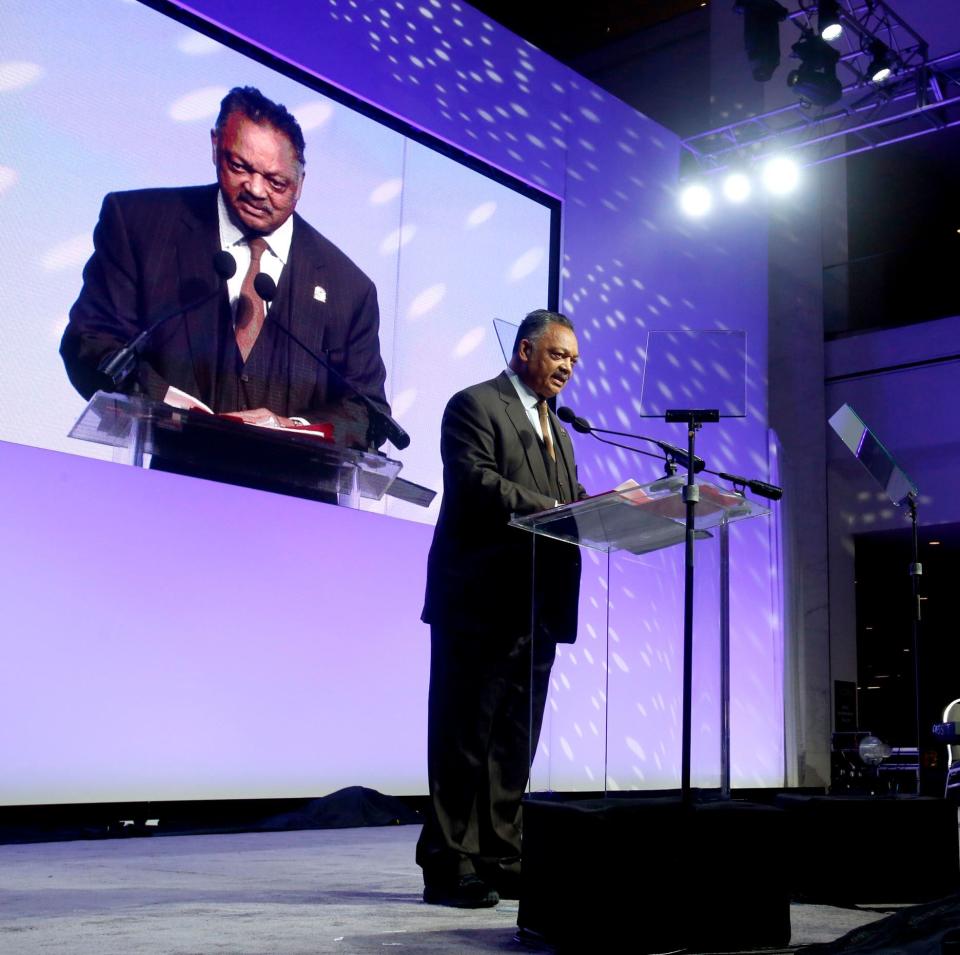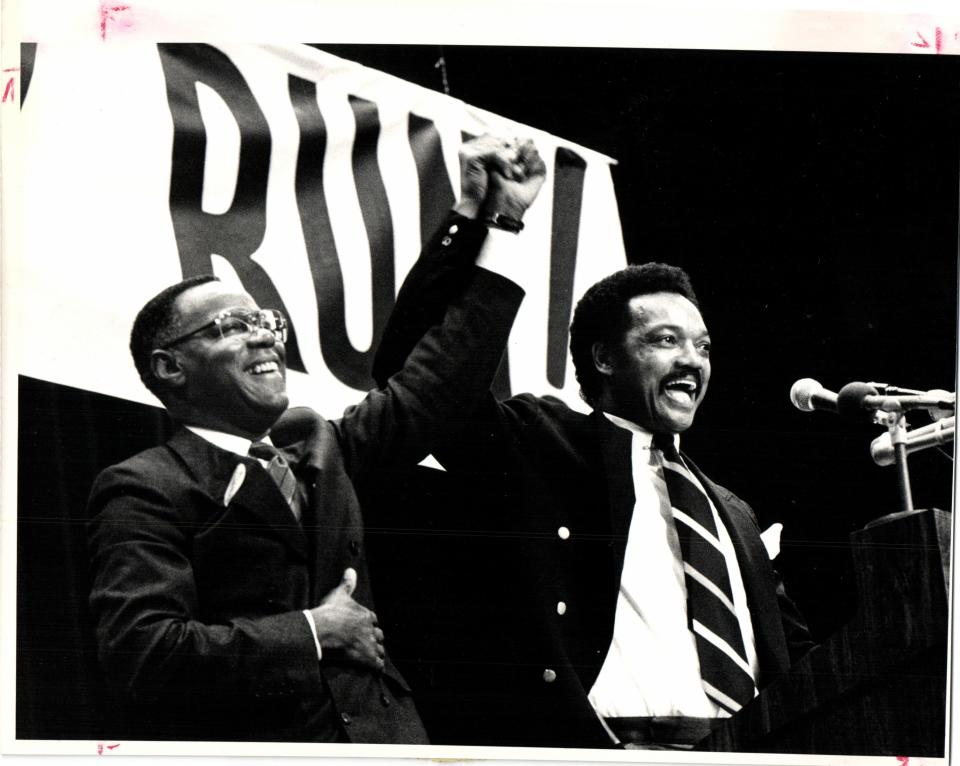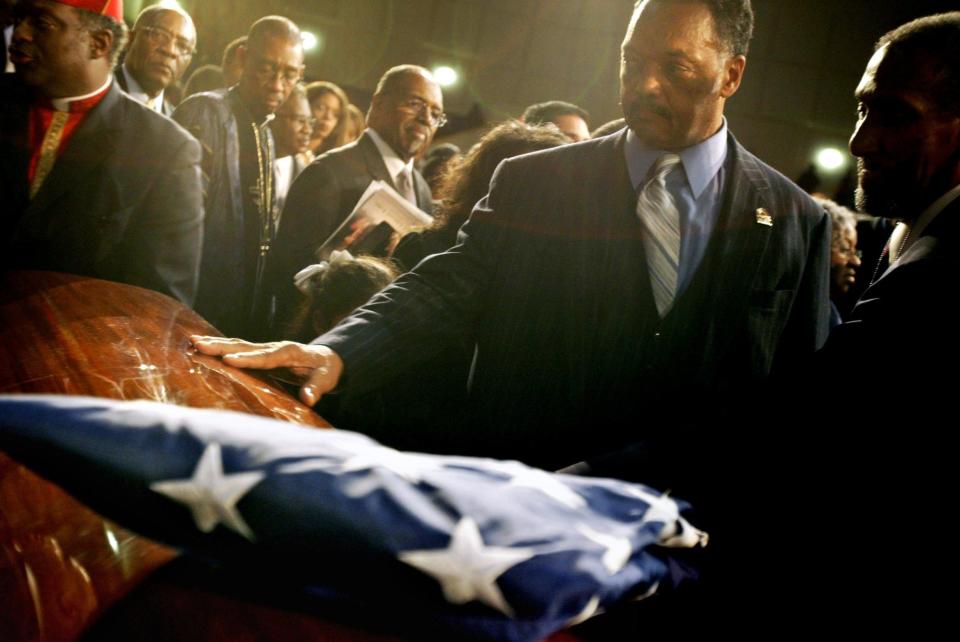With Jesse Jackson stepping down, Michiganders remember his service
- Oops!Something went wrong.Please try again later.
- Oops!Something went wrong.Please try again later.
News on Friday that the Rev. Jesse Jackson Sr., at age 81, was retiring as head of the Rainbow PUSH Coalition came with a mixture of sadness and awe among Michiganders who have long since grown accustomed to the civil rights leader lending his voice and presence to the Black community's priorities in Detroit, Flint and elsewhere.
"It’s a day to be remembered," said the Rev. Horace Sheffield, director of the Detroit Association of Black Organizations and a longtime activist who knows Jackson personally. "Behind Chicago (where Rainbow PUSH is based), Detroit has been the real beneficiary of his work."
Detroit is also one of the seven cities with a Rainbow PUSH chapter office, along with Atlanta; Houston; Los Angeles; New York; Oakland, California, and Washington, D.C.
Several news media organizations reported Friday that Jackson — who ran twice for president in the 1980s — plans to step down as Rainbow PUSH's president, news that was shared by his son, U.S. Rep. Jonathan Jackson, D-Ill. The formal announcement is to be made Sunday at the organization's convention in Chicago.

No specific reason was given for the retirement. Jesse Jackson Sr. was diagnosed with Parkinson’s disease in 2017 but he has remained active, including a visit to Detroit in May to host a "Let Freedom Ring" event at the Fox Theatre on Martin Luther King Jr. Day.
“Detroit has always had a special place in our collective long walk to equity and justice,” Jackson said in a statement before that event. "(In) spite of Dr. King’s death, his truths are still marching on."
Detroit City Councilman Coleman A. Young II said it's not an understatement to say that Jackson "transformed the whole landscape of the Democratic Party," with his presidential runs and his ongoing commitment to equal rights. "MLK marched so Jesse could run and (former President Barack) Obama could fly," he said. "When he (Jackson) said those words, 'I am somebody,' we believed him."
Former Detroit Mayor Dennis Archer knows Jackson well — the civil rights leader spoke on behalf of Archer when the later became head of the state Bar Association. He noted that Jackson has been a champion of diversifying corporate America, from fast-food franchises to automakers. Last year, he visited Detroit to urge automakers to ensure minorities are included in the industry's evolution to electric vehicles.
"Jesse Jackson has always had a prominent role in the city of Detroit," Archer said, "and with the passage of time it's increased." As for choosing this time to step down from Rainbow PUSH, Archer said, "he's earned the right."
Any list of Jackson's direct involvement with Detroit and Michigan in general would be vast, but here are a few highlights from recent (and some not-so-recent) years:
In 1983, he launched his presidential campaign for the Democratic nomination in Flint's Whiting Auditorium, saying he was there to help address the city's economic problems, topped by a 20% unemployment rate. "Now that I am running, how many of you all will vote for me ?" he thundered. He lost Michigan that year to Walter Mondale, the eventual nominee (who was endorsed by Detroit Mayor Coleman A. Young), but won caucuses in the state four years later.

Serving as a TV commentator when South Africa's Nelson Mandela visited Detroit in 1990, Jackson said, by way of explaining why he chose to come to the city, "It's the home of Joe Louis and Nelson Mandela has always admired Joe Louis. ... He's also always wanted to see Rosa Parks, and she is here. And the real base of the struggle is the labor unions."
In 1995, during an ongoing strike at the Detroit Free Press and Detroit News, Jackson showed up on the picket line, encouraging strikers to keep fighting what he called a "dangerous trend" of increasing wealth for a few and rising struggles for the rest of society.
Speaking at the funeral ceremony for civil rights leader Rosa Parks in 2005, Jackson described her actions in refusing to give up a bus seat to a white passenger in Montgomery, Alabama, in 1955 and how it supercharged the Civil Rights Movement. "Her actions for the betterment of society continued throughout the remainder of her life," Jackson said of Parks, who relocated to Detroit.

With Detroit staring down debts that would ultimately lead to the biggest municipal bankruptcy in U.S. history, Jackson in 2013 joined with those urging mass, nonviolent protests against the state appointment of an emergency manager who could overrule elected officials on some issues. "As opposed to having a city council that's democratically elected and a mayor, you'll have a plantocracy, a plantation-ocracy, replacing a democracy," Jackson said at the time.
In 2015, with Detroit Mayor Mike Duggan desperate to get as much as $2 billion in unspent federal funds freed up to knock down abandoned, blighted buildings across the nation — but Democrats in Congress having second thoughts — Duggan remembered Jackson having told him some months before to call if he ever needed help. He made the call and Jackson said he would do what he could. Some hours later he called back — saying Detroit had its commitment from Congress for the funding.
In 2016, in the wake of an emergency being declared in Flint after a change in water supply resulted in high levels of lead leaching from pipes into people's homes, Jackson, along with activist filmmaker Michael Moore, rallied in the city, with Moore accusing former Gov. Rick Snyder of intentionally poisoning the water. A day later, at a packed church in Flint, Jackson demanded justice, calling the entire city "a crime scene."
Recalling the career of singer Aretha Franklin after her death in 2018, Jackson remembered her service to the civil rights cause at Detroit's New Bethel Baptist Church, recalling how once, when King was facing bankruptcy, she went on tour with Harry Belafonte and gave the money to King. "She has a crown of jewels (now in heaven). Jewels for singing. Jewels for serving," he said.

Heaster Wheeler, a longtime community activist in Detroit and a senior adviser to Michigan Secretary of State Jocelyn Benson, said he has quoted Jackson "many, many, many times" over the decades. "He means a lot to a lot of people not only in Detroit but around the world," he said, recalling that Jackson also played a key role in getting Americans released from captivity abroad.
"The fact that African Americans have enjoyed political power all across this country has a lot to do with the way he organized us," said Wheeler. "He organizes at the grassroots level and at the grass tops level. He knows how to get it done ... and he's still showing up. There's something in his DNA that says fight until we win."
Contact Todd Spangler: tspangler@freepress.com. Follow him on Twitter@tsspangler.
This article originally appeared on Detroit Free Press: With Jesse Jackson stepping down, Michiganders remember his service

